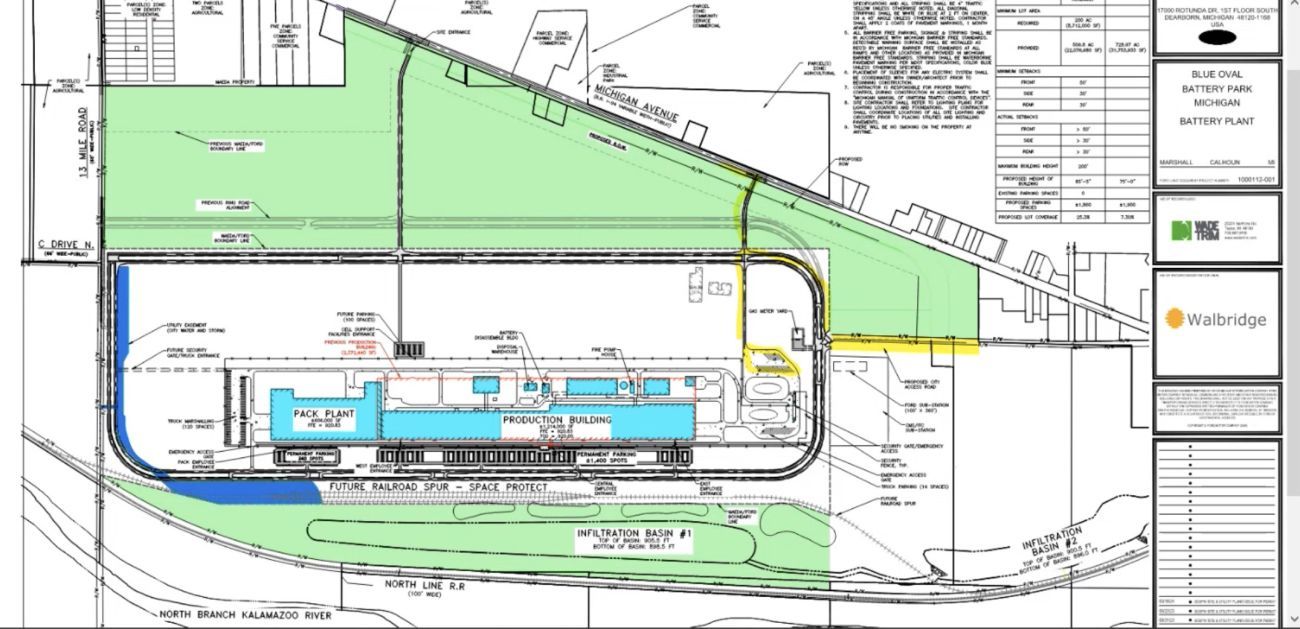As Ford downsizes battery plant, Michigan slashes over $600M in incentives

- State economic development officials pulled over $600 million in incentives for a Ford battery plant in southern Michigan
- The reduction of the incentive — once as high as $1 billion — reflected a downsizing of the project by Ford
- The state has offered over $2 billion in state aid to attract and develop electric vehicle projects
Michigan economic development officials on Tuesday slashed incentives for a Ford electric vehicle battery plant by hundreds of millions of dollars, a tacit reflection of the company’s 2023 decision to downsize the project.
With Ford now planning to create 1,700 jobs instead of 2,500, the Michigan Strategic Fund board unanimously voted to trim as much as $626 million in job-creation and property tax incentives — a 60% drop in state aid.
Since the state first agreed to over $1 billion in incentives to land the project in early 2023, Ford has scaled back plans for its sprawling Blue Oval Battery Park outside Marshall.

Initial plans called for $3.5 billion in company investment. That’s now down to $2.5-$3 billion as the company trimmed its share of the overall business park from more than 700 acres to just over 500 acres.
Ford plans a 1.8 million square-foot manufacturing facility to build electric vehicle batteries, which the company said Monday is 20% complete. The automaker is also building huge battery plants in Tennessee and Kentucky.
Related:
- Ford changes EV strategy but proceeds with smaller Michigan battery factory
- Michigan has spent $1B on EV, battery plants. So far, they’ve created 200 jobs
- Michigan lawmakers eye changes to corporate incentives after Bridge report
Despite the reduction in incentives in Michigan, Ford expressed optimism Tuesday, saying the changes were “consistent” with its own modifications. Local officials continued to hail the project as potentially transformational for Marshall and the region despite the one-third reduction in proposed full-time jobs.
Tony Reinhart, Ford’s director of state and local government affairs, told the board the company was comfortable with the incentive reductions and thanked the state for continued support.
“We are nimbly adjusting our manufacturing operations to match evolving customer demand and the Michigan Strategic Fund board is revising its incentive offers accordingly,” he said in a statement released after the meeting.
Although the growth of electric vehicle sales in the United States has slowed, sales are still rising, and Ford is now No. 2 behind Tesla, delivering 44,000 EVs in the first half of the year.
But last year, Ford temporarily halted construction in Marshall amid a national labor strike by the United Auto Workers union that, among other things, resulted in wage increases.
Earlier this year, Ford announced it was “reassessing” its need for in-house production of batteries. It said its EV business lost $4.7 billion in 2023.
The reframing of the project, located off I-69, west of Marshall, has not upset city and economic development officials. The company has donated $450,000 to local communities, including money for a fountain, the local fairground, a zoo and a theater
“They are demonstrating that they are a true partner, they are listening to us and they are asking for feedback and input, and they are incorporating our ideas and delivering as the mayor mentioned,” Derek Perry, the Marshall city manager, told the board in remarks before their vote.
The steep drop in state incentives comes as Michigan has invested large sums of public money in electric vehicle production, already spending $1 billion in incentives for five companies at six locations. Yet so far, as Bridge Michigan recently reported, just 200 jobs have been created.
Following that report, Republican and Democratic lawmakers who were already calling for incentive reforms began raising questions about whether the state is getting enough for its taxpayer assistance.
“Once again, Michigan taxpayers get stuck with the bill,” Senate Minority Leader Aric Nesbitt, R-Porter Township, said in June.
On Tuesday, though, the strategic fund board quickly approved sweeping changes. A $210 million grant for 2,500 jobs was trimmed to a range of $141 million to $166 million, depending on whether Ford adds 1,700 or 2,100 jobs.
The board also dropped a $772.8 million tax abatement and replaced it with a bigger state education tax increase, which rose by $172.6 million. Overall, the two incentive changes dropped Ford’s potential savings from $1.03 billion to between $384 and $409 million, a 60% decline.
While the number of projected jobs at the Marshall facility is falling, the projected wages are expected to be higher. Workers will make an average of $25.50 an hour — roughly $53,000 a year before overtime, the company has said, up from the $21.70 an hour the company originally projected.
Workers at the plant will be building lithium iron phosphate batteries. The facility is set to open in 2026.
The strategic fund board also reduced incentives for Ford projects at 10 other company facilities in Michigan. Although the company met its overall goal of adding just over 3,000 jobs, it did not meet the specific goal of adding 1,508 jobs at the Rouge Electric Vehicle Center plant in Dearborn.
Because of that, the board rescinded a $100.8 million grant to the company. The vote was unanimous.
Business Watch
Covering the intersection of business and policy, and informing Michigan employers and workers on the long road back from coronavirus.
- About Business Watch
- Subscribe
- Share tips and questions with Bridge Business Editor Paula Gardner
Thanks to our Business Watch sponsors.
Support Bridge's nonprofit civic journalism. Donate today.
See what new members are saying about why they donated to Bridge Michigan:
- “In order for this information to be accurate and unbiased it must be underwritten by its readers, not by special interests.” - Larry S.
- “Not many other media sources report on the topics Bridge does.” - Susan B.
- “Your journalism is outstanding and rare these days.” - Mark S.
If you want to ensure the future of nonpartisan, nonprofit Michigan journalism, please become a member today. You, too, will be asked why you donated and maybe we'll feature your quote next time!




